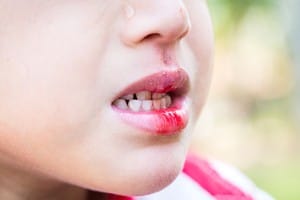Emergency Dentist — Waterford, PA
We Put an End to Tooth Pain

While it’s one of the last things you want to happen, a dental emergency can rear its head when you least expect it. For these tenuous moments, Dr. Patel and the staff at Summit Family Dentistry offer a comfortable and state-of-the-art environment that is geared toward helping patients recover from any type of dental trauma. A highly skilled professional, Dr. Patel understands that in emergency situations, patients need expedient and effective care. Therefore, if you’re suffering from any type of dental emergency, he and his staff are eager to help you get back to leading a normal and pain-free life. To have your oral health fully restored, don’t hesitate to contact our office to schedule an emergency visit.
Why Choose Summit Family Dentistry for Emergency Dental Care?
- Same-Day Emergency Appointments
- Patient Comfort Is of Utmost Priority
- Dental Insurance Welcome & Flexible Financing Available
What to Do in a Dental Emergency

- Call our office right away. As soon as you give us a call, we’ll get you scheduled right away, likely on the same day as your injury. Over the phone, we’ll provide first aid instructions to help you manage your situation in the meantime.
- See Dr. Patel for an emergency exam. Once you get to our office, Dr. Patel will see you for a full evaluation of your condition. After your emergency examination, he’ll explain your options and start working on a custom treatment plan.
- Get the care you need. We’ll work quickly to get you out of pain. Some common services we offer for dental emergencies include fillings, dental crowns, root canal therapy, and extractions.
The Most Common Dental Emergencies
Dental emergencies are usually caused by either long-term neglect or a sudden accident or injury. No matter what the cause, though, you need to know how to effectively respond. If you give us a call, our expert dental team will happily provide you with tips to help you manage your situation. In the meantime, here are some key pointers to remember:
Understanding the Cost of Dental Emergencies

There is no set cost for treating dental emergencies since their symptoms and treatment protocols can vary. In some cases, the remedy may be as simple as taking a pain reliever, while in other instances, more complex care like root canal therapy may be required. All that said, the best way to eliminate any guessing is to contact your dentist to schedule an emergency dental visit. With our expert and compassionate care, you’ll be back to normal before you know it!
How to Prevent Dental Emergencies

It’s true that it’s impossible to avoid all dental emergencies, but that doesn’t mean you can’t avoid 99% of them. Urgent dental problems are not only scary, but stressful and impossible to resolve on your own. That’s why we cannot stress enough the importance of regular prevention. This includes positive oral hygiene, but it also means taking a few precautionary steps throughout your day. You’re always welcome to call our office when experiencing a toothache or other issue, but we strongly recommend taking the following precautions into account as well, so you know how to prevent dental emergencies.
Visit Your Dentist Regularly

One of the most important steps you can take towards protecting your smile is getting routine dental checkups completed at our office. These visits allow us to not only remove plaque and tartar from hard-to-reach areas of the mouth, but confirm that no underlying problems (such as cracked teeth, erosion, or early signs of cavities or gum disease) are present. These issues can easily turn into dental emergencies if left unattended and oftentimes only a dentist can confirm they are apparent.
Maintain Good Oral Hygiene Habits at Home

At-home oral care consists of brushing and flossing, but they aren’t the only ways you can ensure your smile is clean and free of food debris and plaque. After you’ve brushed for at least two minutes at a time using fluoridated toothpaste (which should be done twice a day) and flossed at least once, you can put your attention towards oral rinses. These products are designed to help you remain extra thorough during your oral hygiene. As a bonus, they leave your mouth smelling fresh, reminding you that you’re taking the right steps to keep plaque at bay.
Stick to a Nutritious Diet

Diet plays an important role not just in your long-term oral health, but in reducing your chances of experiencing a dental emergency. For example, chewing very tough foods (such as hard candy) can easily cause a tooth to chip or crack. The same goes for ice cubes, which people tend to suck on out of habit. Any foods that are hard, crunchy, sticky, or chewy in nature should be avoided or consumed with caution. Additionally, make sure that your diet is balanced and includes fruits and vegetables.
Wear a Mouthguard

Do you find yourself to be very active? Are you playing sports that have a high risk for impact, such as football, basketball, hockey, or wrestling? One of the most common causes of dental emergencies is sporting injuries, which is why wearing a personalized mouthguard is so important. The good news is our office can easily design one that fits your smile and provides the most optimal protection.
Use Tools, Not Teeth to Open Packaging

There is always a better tool for the job than your teeth. While enamel is an incredibly hard substance, it can easily break down when introduced to inedible objects. This includes tape commonly used to seal packages or caps on your favorite bottled drink. If you want to avoid chipping (or even losing) a tooth, use a box cutter or pair of scissors instead.
Dental Emergency FAQ’s

We always think that a dental emergency can’t happen to us, but the unfortunate truth is that 1 out of every 6 Americans will be faced with one every year. That’s why it helps to be prepared with as much knowledge in advance as possible. For this reason, we’ve compiled and answered some of the questions about emergency dentistry that we get asked the most frequently here at Summit Family Dentistry.
Will My Tooth Need to Be Extracted?
If your tooth is in severe pain, you might be under the impression that the best way to alleviate your toothache is to just remove the tooth. However, your dentist will generally try to preserve your natural teeth for as long as possible. Extracting a tooth can be a traumatic procedure, and missing teeth may lead to a host of oral health problems down the road. For example, the surrounding teeth may drift to try to fill in the gap, causing orthodontic issues. Your jawbone may also begin to deteriorate, weakening the support for other teeth and increasing your risk for further tooth loss. We typically only extract a tooth as a last resort. Rest assured that if we decide an extraction is what’s best for your oral health, we’ll do our best to make the process as smooth and painless as possible for you.
Will My Toothache Get Better on Its Own?
More often than not, it won’t. Although some general medical problems subside if you leave them alone long enough, dental problems usually worsen the longer you ignore them and put off treatment. A good rule of thumb to keep in mind is that healthy teeth don’t hurt. If you’re experiencing any dental pain, however minor, it’s always a good idea to call your emergency dentist just to be on the safe side. In the meantime, you can take over-the-counter pain relievers like ibuprofen as needed, but don’t procrastinate on getting treatment. If your toothache is caused by an infection, not seeing us soon enough could cause the infection to spread.
Does Dental Insurance Cover the Cost of Emergencies?
Most dental insurance policies will cover at least the partial cost of one emergency visit a year. When it comes to the restorative treatment you’ll need, the percentages of coverage may vary. A filling to cure a cavity-induced toothache, for example, is more likely to be covered than an extraction and tooth replacement. Our team will do everything in our power to maximize your insurance benefits, so you won’t have to pay a cent more than what’s absolutely necessary.
What If My Child Knocks Out a Baby Tooth?
Just like when an adult loses a tooth, keep the tooth moist by storing it in a container of milk. Call us and try your best to get to our office within the hour. We can determine whether the entire tooth was dislodged, or just a portion of it. We can also figure out whether the tooth needs to be reimplanted. If the whole tooth has been lost, and it will be a while before the underlying adult tooth will erupt, we can place a space maintainer in the gap to prevent adjacent teeth from drifting and creating future orthodontic issues.
More to Explore
Preventive Dentistry Restorative Dentistry Cosmetic Dentistry Advanced Technology View Our Services
